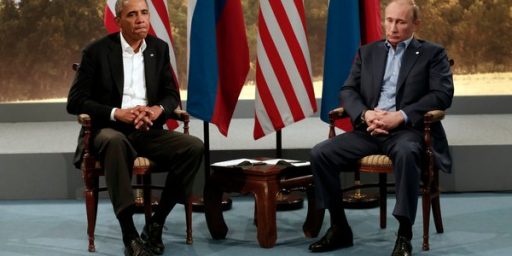Sell Wars That Need Selling
My latest for The National Interest has posted.
My latest for The National Interest, “Smart Wars Don’t Need Selling,” has posted.
__________________
President Obama is pulling out all stops in a thus-far failing bid to convince the American people and their representatives in Congress to back military action in Syria. His secretaries of state and defense have been everywhere talking up the horrors of chemical warfare and the price to be paid in American credibility for inaction. A series of television interviews Monday night will be followed by a primetime Oval Office address Tuesday.
Some lament the timing of all of this, with the president having to compete with the opening of the NFL season, the release of the new iPhone, the start of the school year, and even Yom Kippur for attention. Indeed, he apparently postponed the speech one night so as to avoid having to compete with Monday Night Football. His crosstown rival, Redskins quarterback Robert Griffin III, would surely have won that one, even if he didn’t fare so well against the Eagles.
During the run up to the Iraq War, White House chief of staff Andrew Card famouslyobserved, “From a marketing point of view, you don’t introduce new products in August.” But, given how that launch turned out, perhaps the better lesson is that wars that need to be “marketed” probably shouldn’t be fought at all. Indeed, if requires a hard sell to divert the public’s attention from their daily lives, it’s a good bet that the interest at stake is less than vital.
Franklin Roosevelt didn’t need to mount a marketing campaign to get buy-in from Congress after Pearl Harbor; they declared war on Japan the very next day with only one vote against.
George W. Bush did not have to compete with football season for news coverage after the 9/11 attacks. Not only was even ESPN wall-to-wall with talk about the attacks and their impact but both the NFL and the NCAA promptly postponed their games—as did Major League Baseball and most other sporting leagues. Even the Super Bowl was delayed.
To be sure, the president isn’t proposing anything like our responses to those two attacks.
Deputy National Security Advisor Tony Blinken assures us that, “This is not boots on the ground. This is not Afghanistan. This is not Iraq. This is not even Libya.” Secretary of State John Kerry helpfully adds that it will be an “unbelievably small, limited kind of effort.”
Apparently realizing that this messaging also gets to his counterpart in Damascus, Obama toldNBC News Monday night that, “The U.S. does not do pinpricks,” adding the non sequitur “Our military is the greatest the world has ever known.”
The constantly changing, contradictory, and convoluted logic trotted out over the last three weeks has not exactly inspired confidence.
Is it any wonder that some two thirds of the American public have yet to be persuaded that military action is in the national interest? Or that the president is “not confident” that Congress will authorize it?
Sunday, Bard College professor Walter Russell Mead wryly expressed his hope that “the Good Foreign Policy Fairy comes along and waves her magic wand over this Syria mess and somehow helps the administration avoid the disaster it has struggled so hard to produce.” The next day, she did, in the form of the make-it-up-as-they-go-along amateurism that has characterized the selling of this war.
Asked by a reporter in London Monday whether there was any way for Assad to avoid being hit by the unbelievably small strike that would be by no means a pinprick, Kerry ad-libbed, “Sure. He could turn over every bit of his weapons to the international community within the next week, without delay.” He added, “But he isn’t about to.”
As he flew back to Washington to continue pressing Congress, he got a call from his Russian counterpart, Sergei Lavrov, saying that his country welcomed Kerry’s “plan.” He followed thiswith a public announcement that ”We are calling on the Syrian authorities [to] not only agree on putting chemical weapons storages under international control but also for its further destruction and then joining the Organization for the Prohibition of Chemical Weapons.”
Syrian foreign minister Walid al-Moualem followed this with a statement that his government “welcomes Russia’s initiative, based on the Syrian government’s care about the lives of our people and security of our country.”
Obama reacted with understandable skepticism to this development, acknowledging that it “could potentially be a significant breakthrough” but warning that “you have to take it with a grain of salt.” He promised to “run this to the ground” and “make sure that we see how serious these proposals are.”
Presuming this is not just a stalling move by Moscow, it would be the best possible outcome from the mess created by the administration’s muddled policy pronouncements. To be sure, we would be no closer to the president’s stated objective of removing the Assad government and Assad would not be punished for repeatedly crossing the Obama “red line” on chemical weapons. But Obama could reasonably claim a win for getting Assad to give up the prospect of using said weapons in the future without having to fire so much as a single Tomahawk. More importantly, we would avoid fighting an unbelievably small, limited kind of war that almost nobody actually wants to fight.
James Joyner is a security studies professor at the Marine Corps Command and Staff College and a nonresident senior fellow with the Brent Scowcroft Center on International Security at the Atlantic Council. These views are his own.






The [old advice] is, when you are in a hole, stop digging.
That much is true, yet I am still wary of where this may go. We’ve been busting things up in that region (Pottery Barn Style) since 1953 and I am skeptical that we need to take action now. Finally, did Russia out smart us? I really could not care less.
The first line of discontent was “Obama is foolish to offer a red line, because he can never control Assad’s use of chemical weapons.”
Now, when that red line appears to be confirmed by the international community (including Russia!), the new line is “Obama fails because all he wanted was military force against Assad.”
That’s disturbed, if not dishonest.
And yes, every fear of the slippery slope to Vietnam/Iraq gets put away now too, as Obama confirms that the red line, and chemical weapons, were his concerns all along.
Er, Dr. Joyner(retired, US Army) do you acknowledge that in the war in which you participated, (Gulf War I), the public was initially conflicted?President Bush the Elder had to sell THAT war pretty hard, getting Authorization in the Senate only 52-47.
You might remember that in that conflict GHWB ordered a quarter of a million ground troops into Saudi Arabia without ANY Congressional authorization initially, which seems frankly a lot more than Obama is asking for.
So,
1.Was GHWB wrong to order troops into action then without Congressional authority.
2. Should GHWB not have begun a war that initially needed “selling.”
3. Were you wrong to have gone to a war which, by your standards, shouldn’t have been fought, because it need to be “sold”, was fought despite no imminent threat to US, did not fulfill all the tenets of the so called ” Powell Doctrine”, etc.
This inquiring mind wants to know, in light of your current stand.
Don’t worry downvoters, I understand “mood affiliation.”
@stonetools: First, I did not retiree from the army, having served only four years.
The first Gulf War was an optional fight and we could certainly have sat it out. But there was vast international support for it, including Security Council and regional cooperation. The reason it had to be sold wasn’t because the objectives and connection to the national interest was unclear, as is the case with Syria now and Iraq in 2003, but because we feared very high casualties. That’s a very different issue.
The fallacy of mood affiliation
How else would a removal of chemical weapons, without a bullet fired by the US, be twisted to a failure?
Great article James. This particular section really deserves repeating:
@mattbernius: Thanks, Matt. And I did repeat it–I used that line in a post over the weekend that was the genesis for this article!
@James Joyner:
I stand corrected on the retired from the Army , and thank you for your service.
So, was the Persian Gulf War a smart war, even though it had to be sold? Keep in mind that folks like Sam Nunn and even (then)General Colin Powell didn’t think “the objectives and connection to the national interest” were that clear.
Let’s face it, that whole ” in the national interest ” stuff is really often in the eye of the beholder, and isn’t the crystal clear objective standard we would like it to be.
Also too, most wars that the USA have fought have been marketed-even “good ones” like the Persian Gulf War. Another example of a war that had to be marketed-the US Civil War. As late as 1864, there were plenty of Northerners who would have let the South go. The plain fact is that is you have to apply military force, you are going to have to convince the public to go along in most cases, which means marketing.
When the Nobel Peace Prize winner looks like a warmonger and the dictator looks like the most reasonable man in the room?
@edmondo:
There are broadly two ways to lose an argument: with acceptance or by moving the goalposts.
“War,” in the real honest sense was never something Obama asked for. Strikes and raids, especially with stand-off weapons, are something different.
It is, and always has been, a made-up argument that Obama wanted good old GWB style, Iraq style, “war” with Sryia.
Weak people have pretended that because honest discussion about strikes and raids is harder to oppose. So pretend this is Iraq, it will soothe your conscience at a cost only in truth.
Should I have mentioned the 3rd way to lose an argument?
Down-vote the mean man, with nothing you can actually say in rational defense of your position.
@al-Ameda:
Consider Pearl Harbor.
strictly an air attack, with no boots on the ground.
@Eric Florack:
That is exactly what Obama is proposing, so …. ?
The president is not proposing full on invasion and troops on the ground, and even so, at this time I do not support direct American intervention in the Syrian Civil War.
I find it interesting that conservatives are now happy that the president was not given authorization for his plan, and are at the same time criticizing him for bringing this (his case) to Congress for consideration.